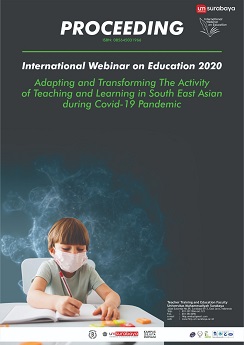Analysis of comprehension scientific literacy concept of science education students at UNIMUDA Sorong
Abstrak
Abstract.
The aims of this study is to find out how students of science are comprehended
about science literacy concepts with the indicators of basic concepts of science, process of science, and the concept of science. The research approach is a descriptive study. The formulation of the problem is how to comprehend the concept of literacy in the education students of the Faculty of Teacher Training and Education at UNIMUDA Sorong in the academic year 2018/2019. The sample consisted of 20 students in 3rd semester students who followed in the Science Concept Basic Subject. Data collection techniques used multiple choice tests. The analysis technique used percentage formula. Then it is done through data reduction, data presentation and conclusions. The result of this research showed that most of the students of science already mastered the science literacy concepts. The criteria which has been appointed by PISA 2015 that is, the basic literacy science concept, the students achieved 66% (very high), the content of science is 60% (high), the process of science is 52% (enough), the science application context is 43%. So based on the result it needs to improve science
learning in the content and context science through observation, demonstration, and practice process. So the students will be trained in writing practice report and deliver their observation result that has been conduct in science laboratory.
Referensi
Mendikbud. Gerakan Literasi Nasional: Materi Pendukung Literasi Sains. Jakarta: Kementerian Pendidikan dan Kebudayaan, 2017.
OECD. PISA 2015 Assessment and Analytical Framework, Science, Reading, Mathematics and Financial Literacy, PISA, 2015.
National Research Council. A Framework for K-12 Science Education: Practices, Crosscutting Concepts, and Core Ideas, Committee on a Conceptual Framework for New K-12 Science Education Standards, Board on Science Education, Division of Behavioral and Social Sciences
and Education, Washington, DC. 2012.
S Arikunto. Prosedur Penelitian: Suatu Pendekatan Praktik. Jakarta Rineka Cipta, 2013.
L. J. Moleong. Metodelogi Penelitian Kualitatif Edisi Revisi. Bandung: PT Remaja Rosdakarya, 2011.
Hayat, Bahrul, & S. Yusuf. Benchmark Internasional Mutu Pendidikan. Jakarta: Bumi Aksara, 2011.






